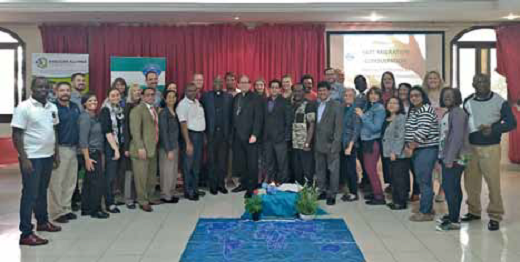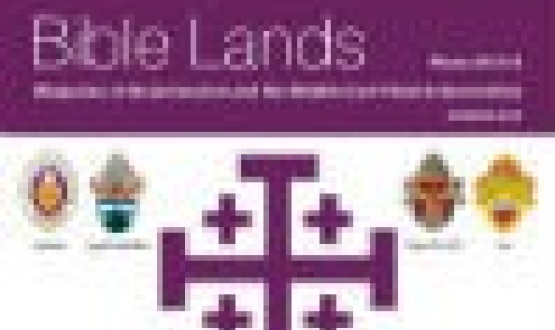A report from Joel Kelling – Provincial Administrator and Anglican Alliance Regional Facilitator for the Middle East.
The impact of the Covid-19 pandemic continues to affect and shape the way we all live. There have been some positives – such as the enforced jubilee for the earth, lockdowns and curfews provided around the world; planes have been grounded and cars prevented from taking to the road. At the same time, this time of enforced isolation has exacerbated existing vulnerabilities and exposure to exploitation. In the Middle East, we have seen jobs lost, mental health suffer and domestic violence increase.
Some of the most vulnerable people at this time are those who have moved within and into the region, either displaced by conflict or persecution, or those economic migrants searching for opportunities to better provide for themselves and their families. In Lebanon for example, the economic crisis has led to many domestic workers losing their jobs. Following the explosion at Beirut’s port on the 4th August, the plight of these migrants has become more severe, many sleeping on the streets outside their embassies looking for help to return home, and even more vulnerable to exposure to Covid-19, cases of which have dramatically increased in the aftermath of the explosion.
The Anglican Church, and particularly the Archdeaconry of the Gulf, has been engaged in work to support migrant workers for some time now. It should be noted that the majority of the congregations in the Gulf are made up of migrants, from a wide range of nationalities and work backgrounds, from Canada to Australia, Nigeria to Bangladesh and from executives to domestic cleaners. St. Martin’s, Sharjah, for example, has a Migrant Outreach Ministry, including Telegu and Urdu language services meeting in Labour Camps, or collecting people from their overcrowded privately rented accommodation in their mini-van. St. Thomas’ Al-Ain has been working with other Christian groups to provide essential items, including menstrual products for female workers in the camps of Al-Ain, adjacent to where the diocese hopes to eventually build a new church building.
It has been my great privilege to visit these people in their homes, to share in their lives and worship, and to experience the great compassion the church has for those in spiritual and physical need. In February of this year in Dubai, UAE, just prior to the lockdowns enacted to combat the spread of Covid-19, I helped to facilitate an Anglican Alliance Safe Migration consultation in collaboration with the Mission to Seafarers. We gathered Anglicans from across the Gulf, Christians from some of the diverse denominations present in the United Arab Emirates, as well as Anglican partners from East Africa, South Asia and South-East Asia. During our time together we participated in Bible Studies on the themes of accompanying, slavery, and freedom. We visited a Labour Camp and a Fishermen’s Village, listening to the stories of those who had come in search of better opportunities for themselves and their families, hearing about their struggles, and praying with the many Christians in their number. We heard theological reflections to modern slavery, led by Bishop Alastair Redfern, Chair of the Clewer Initiative (the Church of England’s response to Trafficking and Modern Slavery), as well as being joined by Archbishop Michael Lewis and Bishop Julius Wanyoike of the Kenyan Diocese of Thika.

Safe Migration consultation in Dubai, Feb 2020 (pre-lockdown)
We worked together to look at how the church is and can respond, globally, locally and inter-regionally to the challenges of exploitation and coercion of people on the move, mapping the partnerships and assets that we share as a part of the global Anglican Communion, and the ecumenical presence of churches in the Gulf.
One of the key messages of the consultation was that we don’t seek to prevent migration or demonise it, either the desire to go in search of better opportunities for oneself and one’s family, or the countries of departure and arrival.
It was therefore particularly interesting to learn about the work of Fifty-Eight, a technology-focused, faith-based NGO that has developed the ‘Just Good Work’ app, which has been launched in Uganda and Kenya (in partnership with the Anglican Church of Kenya). Currently available in English and Kiswahili it gives valuable information about the process of recruitment, what to expect and what your rights are before you apply for a job in the UAE, Saudi Arabia or Qatar. The app has contact numbers for support on arrival, along with other in-country support, and can be a great advocacy and training tool for migrants and their families. Hopefully, in partnership with churches of the Anglican Communion, the app will add Bahrain and Kuwait as destination countries soon, with additional departure countries being worked on. Our role as the church is to alert people to the existence of the app, so that potential migrants are well placed to make informed choices.
People are on the move across the world, and given the spread of the Anglican Communion, are often moving from one Anglican Province to another. This means that Anglican churches have the opportunity to work together to ensure those who are looking for work abroad are informed about the realities of the situation and their rights, as well as to support those who are struggling following migration, and assisting the victims of trafficking and modern slavery pastorally and restoratively.
It is our failure to acknowledge the humanity of these migrants that helps perpetuate their vulnerability to abuse. Our opportunity as a community of faith is to work together to support our brothers and sisters in Christ as they travel around the globe.
This consultation was the second phase in what will hopefully be the continued development of Anglican responses to Safe Migration, Human Trafficking and Modern Slavery in the region. In February 2019, the Diocese of Jerusalem’s Women’s Ministry met for a two-day workshop on the issue and there are plans for workshop in Cyprus in 2021.
This month, a report on the Safe Migration consultation has been published. As well as a report on the activities of the consultation itself, it is a resource for understanding what human trafficking and modern slavery are, with some theological reflections on the issue and frameworks of how we can respond. Please feel free to read or download a free copy of the report HERE.

